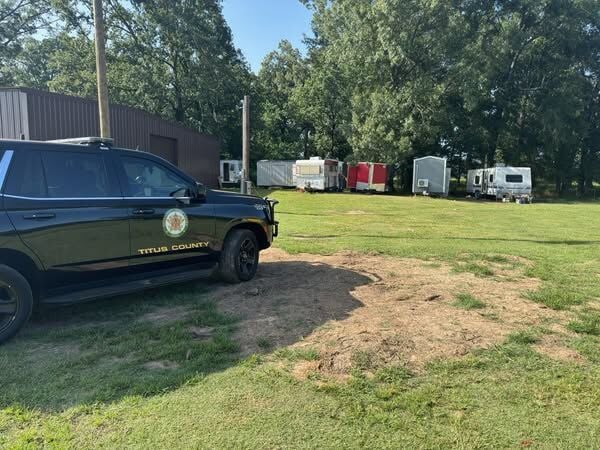Tyler officials address water rate hikes and concerns
Published 3:45 pm Tuesday, February 4, 2025

- Informational papers outlining water rate increases and Tyler Water Utilities’ infrastructure projects sits on a table at the community meeting for residents to review. (Katecey Harrell/ Tyler Morning Telegraph)
Tyler Water Utilities is hosting a series of come-and-go community meetings to help residents in the city’s five districts better understand water rate increases.
“The No. 1 complaint is rising costs associated with their water bills,” District 5 councilmember Lloyd Nichols said. “They don’t understand it. They don’t think it’s right.”
A community meeting for District 5 was held last Thursday. This week, District 2 residents will have the opportunity to attend a meeting Thursday at the Rose Garden Center’s Bluebonnet Room, located at 420 Rose Park Dr.
Residents can visit information stations staffed by department directors and have the opportunity to speak directly with District 2 councilwoman Petra Hawkins. Water customer service representatives will also be available to assist with individual account questions.
Both online and at the event, many Tyler Water Utilities customers complained about the rate increases. However, others, like Tyler resident Jody Gibson, attended the meeting to better understand the changes.
“A lot of people, either through social media, talking at church or whatever, are upset about their water bill, and through my own personal research, I realized that they were not educated at all and they’re mad about the wrong things,” Gibson said.
Many residents assume their water bill covers only water usage, but it also includes sewage and trash services and costs associated with the Environmental Protection Agency (EPA) consent decree, Nichols said.
Implemented in 2017 under the Trump administration, the EPA federal mandate required the city to invest in sewer and water infrastructure improvements. Much of this work happens underground, making it less visible to residents.
However, when streets are torn up and crews are digging, it’s often part of the ongoing effort to replace aging infrastructure in compliance with the mandate. The city has made significant investments, totaling nearly $250 million, in sewer and water infrastructure over the past decade.
Some residents say the water is undrinkable due to its taste and odor. That’s why the City of Tyler is conducting a study to explore ways to improve the taste and odor quality of the water — another costly but necessary improvement.
“The main reason we did it was to look to see what kind of treatment technologies could remove, primarily the geosmin, because that’s our main taste and odor compound,” Utilities Director Kate Dietz said. “We know it’s a big concern for customers, and we want them to know that we hear them and we’re trying to take care of it.”
Geosmin is a naturally occurring compound known for its strong, earthy taste and odor. The Lake Palestine plant sources its water from Lake Palestine, which has inherently high levels of geosmin due to the lake’s age and the amount of natural organic matter present.
This study is currently at the pilot stage, not at the plant itself. The goal is to assess how much of the taste and odor issues can be removed. Once completed, the study will provide a report detailing which methods were most effective and cost-efficient, specifically for Tyler’s plant.
This will allow the city to develop a funding plan for implementing these solutions at the current plant. When the plant eventually needs to be expanded in the next 15 years, these improvements will be included in the construction process, potentially lowering the overall costs.
The increase in water bills are attributed to factors, including:
One of the major projects is the construction of an elevated water storage tank in the Highway 155 and Earl Campbell Parkway area, a high point in the city. This location is ideal for improving water distribution, especially during the summer months when demand peaks.
The elevated storage tank will help with water quality by impacting water age and will also improve reliability and water pressure. These types of projects are essential for maintaining both the quality and efficiency of the water system, and they’re among the primary focus areas for the city’s water infrastructure improvements.
In addition to the water projects, there are significant improvements planned for the city’s wastewater system. Upgrades are scheduled for both the South Side and West Side wastewater treatment plants.
Ongoing work in the collection system, stemming from the consent decree, will continue even after the decree is completed. Maintaining the collection system remains a priority, ensuring infrastructure stays up to date and capable of handling the city’s wastewater needs efficiently.
Another important component contributing to the increase is the installation of new water meters. These upgraded meters are designed to improve accuracy in billing and provide real-time data for better monitoring of water usage.
The new system will help detect leaks more quickly, reduce water loss and ultimately improve the efficiency of the water distribution system. This upgrade is essential for maintaining a reliable service and ensuring residents are charged fairly based on their actual water use.
“Where is the money going? The big point there is it’s going toward much needed rehabilitation of the infrastructure, whether it’s the wastewater system or the water system,” Dietz said. “We have crumbling infrastructure all across the United States. Tyler, Texas is no different. What we’re doing now is trying to get ahead of it being a major issue.”
Stations at the events focus on visible projects, such as the elevated storage tank and taste and odor control, and the less exciting but essential work behind the scenes, Dietz said. Much of the maintenance ensures systems continue to run smoothly.
These upgrades are crucial for making sure residents can always rely on having water when they need it and that basic services, like flushing toilets, remain uninterrupted.
“Different fees have changed, but they haven’t changed in years,” Gibson said. “There is infrastructure that needs to happen in the City of Tyler, and they’re trying to replace pipes and upgrade the systems, and that costs money.”
The remainder of district meetings are as follows:
District 4 – James Wynne
Thursday, Feb. 20 from 5:30 to 7:30 p.m.
Tyler Chamber of Commerce, Genecov Room, 315 N. Broadway Ave.
District 3 – Shirley McKellar
Tuesday, March 11 from 5:30 to 7:30 p.m.
Glass Recreation Center, Large Classroom, 501 W. 32nd St.
District 1 – Stuart Hene
Thursday, March 20 from 5:30 to 7:30 p.m.
South Tyler Police Station, Meeting Room, 574 W. Cumberland Rd.
District 6 – Brad Curtis
Thursday, April 3 from 5:30 to 7:30 p.m.
Pollard United Methodist Church, Gym, 3030 New Copeland Rd.






